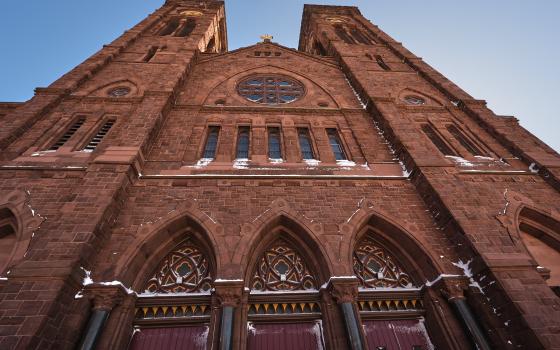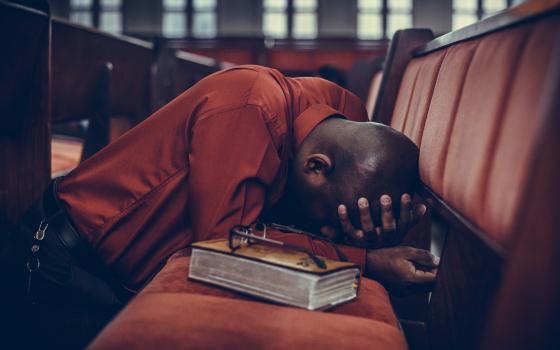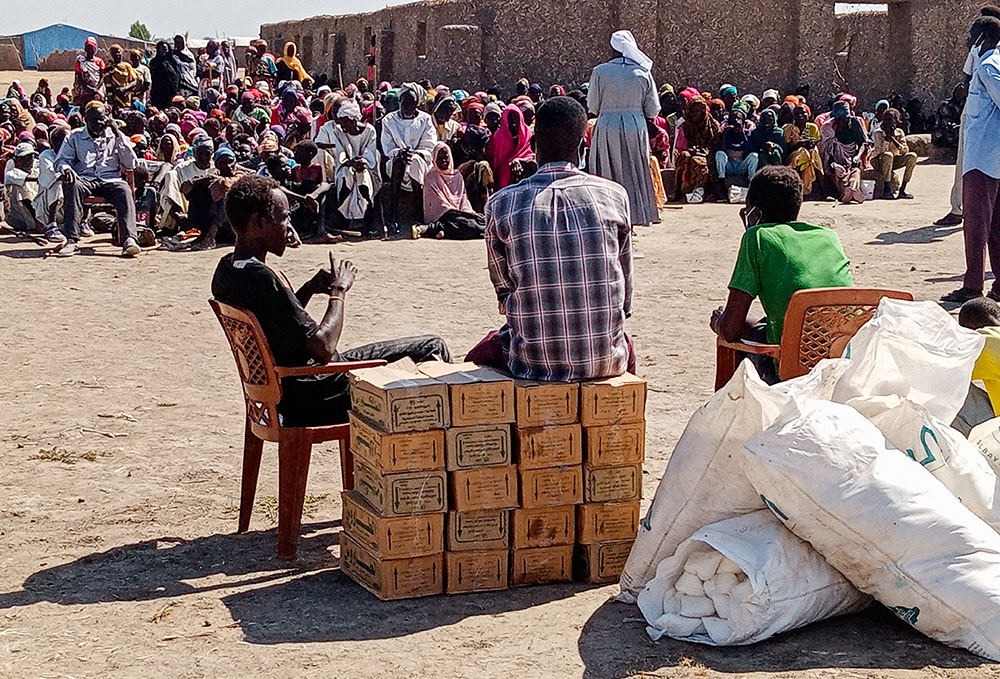
Refugees gather for aid distribution in White Nile State, Sudan, as Catholic sisters coordinate the delivery of essential supplies to families uprooted by war. (Courtesy of Sisters of the Sacred Heart of Jesus)
Beneath a scorched sky in Sudan's Al Kashafa Camp, 34-year-old Ayak Anyieth clutched her newborn daughter against her chest. She had delivered the baby under a tree with no medical assistance, no shelter and no food — only fear and prayer.
Salvation came not from officials or aid agencies, but from Catholic sisters moving through the camp, bringing care, comfort and the first signs of hope.
"One of the sisters found me bleeding and alone," Anyieth told Global Sisters Report. "She cleaned me, wrapped my baby in her shawl, gave me medicine, and prayed with me. Without her, I would have died."
Anyieth is one of the many refugees receiving care from a small group of Catholic sisters who have chosen to stay in Sudan despite a brutal civil war. Kosti, a trading hub on the banks of the White Nile in south-central Sudan, has become a lifeline for those escaping the violence. The town and its surrounding areas are now home to sprawling camps sheltering tens of thousands displaced by fighting.
Sudan has been mired in conflict since April 2023, as clashes between the Sudanese Armed Forces and the Rapid Support Forces continue to devastate the country. The United Nations Refugee Agency reports that approximately 25 million people are in urgent need of aid and protection. However, ongoing violence and limited funding have made it difficult for humanitarian groups to reach many affected regions.
'What we do in these camps is not just an assignment — it's a calling, and we carry it out with humility, peace of heart, and dedication.'
The conflict in the northeast African nation, home to more than 50 million people, has displaced more than 12.4 million people, including at least 3.3 million who have sought refuge in neighboring nations. As the war stretches on, it is driving widespread hunger, outbreaks of disease, and the breakdown of health care services.
Despite the danger, four Sisters of the Sacred Heart of Jesus have remained in Sudan, continuing their mission in White Nile State and el-Obeid. Their presence has become a lifeline for thousands with no other support.
"Despite our limited means, we continue to offer faith, hope and love to the people in these camps," said Sr. Mary Achwany George, who stayed behind after her older, ill colleagues were evacuated.
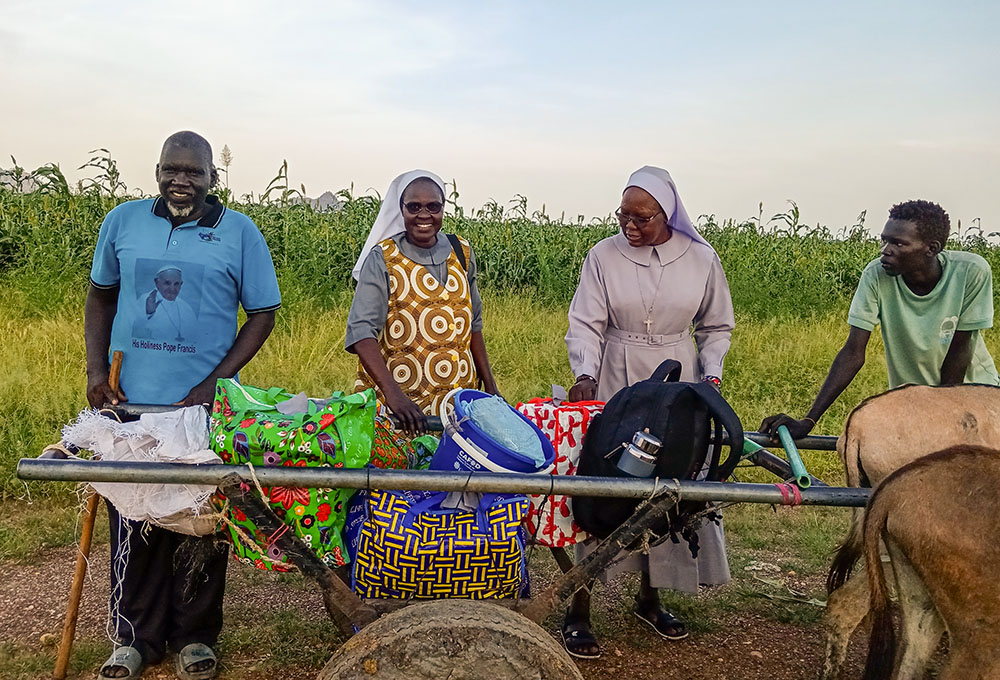
Catholic sisters and local residents load relief supplies onto a donkey cart in El Obeid, Sudan, preparing to deliver aid to displaced families in remote areas. (Courtesy of Sisters of the Sacred Heart of Jesus)
The sisters say they serve 11 refugee camps across the Jaballain area, about 50 miles south of Kosti. Initially built for South Sudanese fleeing conflict in 2013, the camps have grown rapidly due to Sudan's current war and now shelter an estimated 650,000 internally displaced people across White Nile State, according to the U.N. Refugee Agency.
"The conditions are unimaginable, especially for women, children, the elderly and the disabled," said George, who also serves as a nurse and pastoral agent.
The sisters, aided by a diocesan priest, catechists and lay volunteers, offer trauma healing, catechism, youth mentorship, prayer services and funeral rites. They run feeding programs for children and vulnerable adults and teach the rosary and the Chaplet of Divine Mercy.
"Our work as Catholic sisters among the refugees includes visiting the sick in homes and health centers, and conducting workshops on peacebuilding, HIV/AIDS awareness, and behavior change for youth," said Sr. Georgina Victor Abingkwaec.
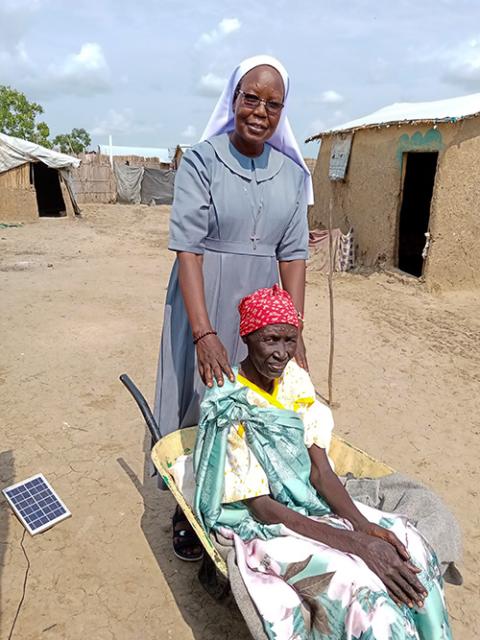
A Catholic sister helps transport an elderly woman in a wheelbarrow at a refugee settlement in el-Obeid, Sudan. (Courtesy of Sisters of the Sacred Heart of Jesus)
"We walk long distances, three to four hours at times, in the heat or rain to reach them. It's hard work, but we do it with joy, courage and love."
The sisters said the suffering in the camps is severe. Makeshift shelters made from plastic and cloth fail to protect against heavy rain or blistering heat. Refugees, many of them South Sudanese, face repeated abuse. Some are arrested, deported, beaten, raped or even killed, said the sisters.
"In Kosti, some are arrested and taken to the border with South Sudan. Even mothers who are breastfeeding are arrested in the market, leaving their babies behind," George told GSR. "They walk back from the border, collect their children, and seek refuge again."
Security restrictions have made it harder for the sisters to move freely or deliver aid. "Although our movements are restricted by security personnel like any other refugee, sometimes we're allowed to travel — especially if we say it's for sickness or prayers," Abingkwaec said.
"We take that risky opportunity to bring in support from well-wishers for the vulnerable people."
The sisters said health care is one of the most pressing concerns. Local clinics are overwhelmed, pharmacies are empty, and private treatment is unaffordable. "We are losing many children to measles," said George. "Pregnant women are malnourished, miscarriages are common, and the elderly die from preventable diseases. It breaks your heart."
To provide medical care, sisters walk for hours to reach the sick and elderly.
Advertisement
With international aid hampered by the conflict in Sudan, sisters said displaced families find the camps in cities like Khartoum or Madani overcrowded and underresourced. The sisters also said the monthly food rations have fallen below 50%, yet families keep arriving, driven by hunger, fear and occupation of their home villages by armed groups.
George, one of the longest-serving sisters in conflict zones, said she has lived through war since the early days of her religious life. "Our charism as Sacred Heart Sisters is to serve the poorest of the poor. What we do in these camps is not just an assignment — it's a calling, and we carry it out with humility, peace of heart, and dedication."
Beyond functional, the sisters' presence is also spiritual. "We have been managing the situation really through the protection of God's grace and the support of well-wishers," Abingkwaec said. "The church's presence brings hope and protection not only to refugees but to the host communities."
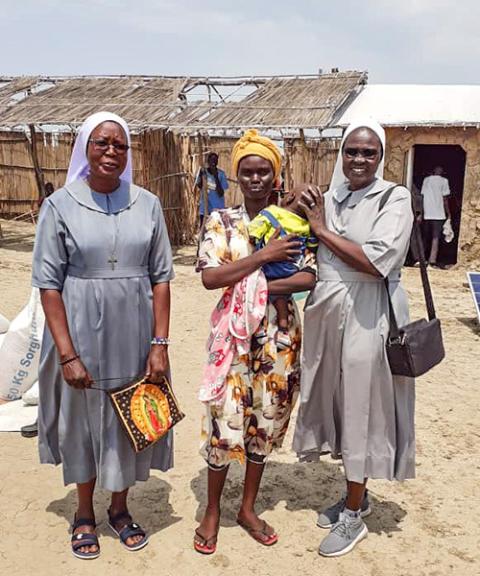
Two Catholic sisters stand with a mother and her baby at a refugee settlement in White Nile State, Sudan. (Courtesy of Sisters of the Sacred Heart of Jesus)
The challenges are immense. According to the sisters, the conflict has devastated infrastructure and communication equipment, leaving communities cut off. Out of fear for their safety, many hesitate to speak openly, worried that their words could be interpreted as siding with either the Rapid Support Forces or Sudan's national army. Essential daily activities such as cultivating vegetables or gathering firewood are curtailed, as those movements could put them at risk.
Yet the sisters press on. They hope to support at least 200 households per camp with shelter materials, food and medicine. In a context where human dignity is constantly eroded, "we want to uphold the dignity of these people," George said. "We want to see a future where refugees can return home safely, rebuild their communities, and live in peace."
Their message to the world is clear: "Nobody benefits from war or disunity. Let us therefore make every effort to do what leads to peace and to mutual edification. Let the world imitate Christ by advocating for peace, justice, reconciliation and the respect for human dignity."
For Anyieth, whose baby girl is now 6 weeks old, the sisters represent something greater than survival.
"I had no one — no husband, no doctor, no food," she said. "But the sisters came. They didn't just help me deliver my child. They reminded me that I still matter."
As the sisters continue walking beneath the Sudanese sun — blessing the dead, feeding the hungry and comforting the broken — they offer more than services. They offer a radical witness of compassion amid collapse.
"We may lack much," George said. "But we are here. And we are not giving up."





